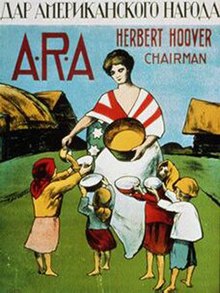Foreign policy of Herbert Hoover
In 1921, to ease famine in Russia, the ARA's director in Europe, Walter Lyman Brown, began negotiated an agreement with Soviet People's Commissar for Foreign Affairs, Maxim Litvinov in August, 1921; an additional implementation agreement was signed by Brown and People's Commissar for Foreign Trade Leonid Krasin on December 30, 1921.
The Medical Division of the ARA functioned from November 1921 to June 1923 and helped overcome the typhus epidemic then ravaging Russia.
Hoover strongly detested Bolshevism, and felt the American aid would demonstrate the superiority of Western capitalism and thus help contain the spread of communism.
[8] The treaty represented the first time that the naval powers had agreed to cap their tonnage of auxiliary vessels, as previous agreements had only affected capital ships.
[10][11] At the 1932 World Disarmament Conference, Hoover urged further cutbacks in armaments and the outlawing of tanks and bombers, but his proposals were not adopted.
[9] In 1931, Japan invaded Manchuria, defeating the Republic of China's National Revolutionary Army and establishing Manchukuo, a puppet state.
[14] The new law and tariffs imposed by America's trading partners in retaliation were major factors of the reduction of American exports and imports by 67% during the Depression.
Hoover did not completely refrain from the use of the military in Latin American affairs; he thrice threatened intervention in the Dominican Republic, and he sent warships to El Salvador to support the government against a left-wing revolution.
Hoover in 1930 endorsed the Clark Memorandum that repudiated the Roosevelt Corollary in favor of what was later called the Good Neighbor policy.
The moratorium was the result of a proposal President Hoover issued on 20 June 1931 that was intended to ease the ongoing international financial crisis and provide time for recovery.
The proposal was met with initial disapproval from France[26] and many American citizens, but after much telephone lobbying by Hoover, it had gained support from 15 nations by 6 July.
[27] A few of the former Allies continued to make payments to the United States on their war loans after the moratorium expired, but only Finland was able and willing to meet all obligations.
He repeated his warning that the massive manpower advantage of the communist states, now including China, made land warfare a losing proposition for America and its allies.
